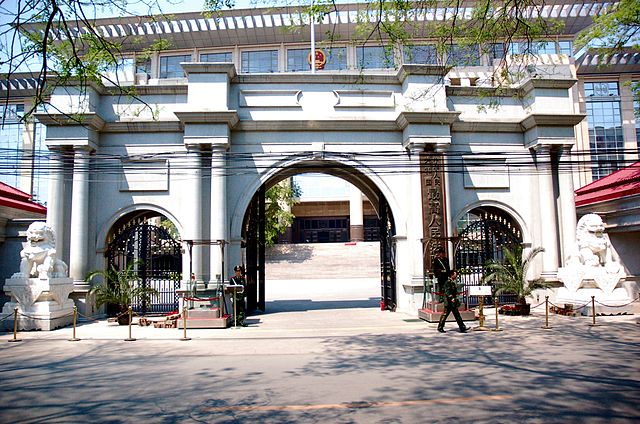China’s Hostage Diplomacy
An obscure Chinese drug case has been pushed to the center of China’s relations with Canada—and, by implication, with the rest of the world. The case appears to reinforce the message, previously suggested by the detentions of Canadians Michael Kovrig and Michael Spavor, that China views the holding of human hostages as an acceptable way to conduct diplomacy.

Published by The Lawfare Institute
in Cooperation With

An obscure Chinese drug case has been pushed to the center of China’s relations with Canada—and, by implication, with the rest of the world. The case appears to reinforce the message, previously suggested by the detentions of Canadians Michael Kovrig and Michael Spavor, that China views the holding of human hostages as an acceptable way to conduct diplomacy.
Canadian Robert Schellenberg entered China in November of 2014 and was detained the following month on charges of planning to smuggle almost 500 pounds of crystal methamphetamine from China to Australia. Sentenced just last November to 15 years’ imprisonment, he effectively lost—indeed, more than lost—his appeal in the Liaoning Provincial High Court on Dec. 29, 2018. The High Court sent his case back for retrial, suggesting a harsher sentence would be appropriate. That could include the death penalty.
Several unusual features of the Schellenberg case suggest that it may be connected to China’s efforts to get Meng Wanzhou, the Huawei executive detained in Canada on Dec. 11, released before she is extradited to the United States to face charges of bank fraud related to Iran sanctions.
1. Extraordinary delay in trial and sentencing. The original trial was on March 15, 2016. Given that Schellenberg was detained more than a year earlier, on Dec. 3, 2014, that already represents an unusual delay in China’s usually speedy criminal procedure system. (In the case of Yang Jia, for example, in which the defendant was charged with premeditated murder of six police officers, less than two months elapsed between the date of the offense and the date of the trial, and those proceedings were actually delayed because of the Beijing Summer Olympics.) And the sentence was not pronounced until more than 32 months later, on Nov. 20, 2018. China's Criminal Procedure Law says that sentencing should normally be within two months of the trial, and at most three months. That period may be extended a further three months for various reasons with the permission of the court above the one that conducted the trial. Any further extension requires the sentencing court to apply to and receive specific permission from the Supreme People's Court, China’s top judicial body. Was that obtained? And why was there a delay in the first place, both before the trial and between trial and sentencing?
Usually this kind of delay is a sign of internal controversy within the judicial system, and suggests that the case in question is not open-and-shut. Perhaps the evidence of Schellenberg’s guilt was weak. In such cases, the court doesn't want to embarrass police and prosecutors by acquitting, but it is also reluctant to convict, so it just sits on the case. This is happening, for example, in the extraordinary case of Mark Swidan, tried in 2013 by the Guangdong Jiangmen Intermediate People's Court. Swidan has consistently maintained his innocence, and over five years after the trial, the court has yet to issue a judgment.
2. The decision to send back for retrial. The outcome of the appeal (announced after only twenty minutes of deliberations, suggesting that it was decided in advance) is very unusual. The court, instead of deciding the appeal one way or the other by itself, sent the case back down to the original trial court for a re-trial (chongshen 重审). On the basis of a quick-and-dirty calculation using available statistics, I found that in 2017, re-trials were ordered in at most two percent of criminal appeals.
The circumstances of this particular retrial order make it even more of an outlier. When cases are sent back for retrial, it is generally because clearing up unclear facts is expected to benefit the defendant. A knowledgeable colleague agreed that he had never heard of a case being sent back for retrial on the grounds that clearing up unclear facts might show that a heavier punishment was merited. (I should note that I have no statistics on this and am relying only on impressions gathered over the years. I cannot affirm that no such cases exist.)
Why the highly unusual outcome in the Schellenberg case? It might be random chance. But it might be something else. China’s Criminal Procedure Law does not allow an appeals court to increase the sentence when a defendant appeals. It can increase it if the procuracy (China’s prosecuting body) also appeals. So may be that the procuracy did not formally appeal Schellenberg’s sentence—remember that any decision about this would have been made in November, before China had any interest in politicizing cases involving Canadians. If it did not, then the original sentence of 15 years could not be increased by the appeals court.
But there is a loophole in the law. If, as in this case, the appeals court doesn't make a decision and instead sends case back down for retrial, there is no rule that says the original court cannot impose a harsher sentence on retrial. And during the appeal hearing, the procuracy alleged new and more serious facts that would justify a death sentence. Thus, sending the case back for retrial gives China the opportunity to threaten death and to drag out that threat for as long as necessary. Schellenberg could, for example, be sentenced to death with a two-year suspension. Even though such sentences are virtually always commuted when the two-year period expires, everyone would understand that the Chinese authorities could always find a reason not to commute.
3. Extraordinary speed in scheduling the retrial. Schellenberg’s retrial has been scheduled for Jan. 14, a mere 16 days after the appeal decision. This is barely time for the minimum 10 days’ notice of trial required by China’s Criminal Procedure Law (Art. 187), and it is not clear that notice was in fact provided on or before Jan. 4 as required. Given that the prosecution apparently plans to make new allegations that would justify the imposition of a death sentence, such a brief time is utterly inadequate for the preparation of a meaningful defense.
4. Why invite the international press? China’s State Council Information Office laid on a special trip to Dalian for the international press to observe the appeal hearing. Why? China had 1.3 million criminal cases in 2017, of which about 110,000 were drug cases. No doubt the numbers for 2018 are roughly similar. What was so special about this case? China’s attitude toward media observation of trials seems to be that if the media want to observe, they cannot, but they may be invited to observe proceedings in cases that had previously garnered little or no publicity.
Two possible hypotheses suggest themselves: (1) China wished to show the international community that Chinese criminal proceedings give full due process to defendants and fully protect their rights; (2) China wished to show Canada that it is deadly—literally deadly—serious about getting Meng Wanzhou released.
The account of the hearing provided in a Twitter thread by Wall Street Journal reporter Eva Dou effectively rules out the first hypothesis. The combination of unusual circumstances—inviting the press to observe, the rarity of the outcome and the haste of the retrial—all point to the second as more plausible.
If this hypothesis is correct, then China has moved from merely detaining Canadians as hostages to actually threatening—subtly, to be sure—to kill a Canadian who would otherwise not have been executed if it does not get what it wants.
To be sure, this is only a hypothesis. Schellenberg’s original conviction and sentencing cannot be connected to the Meng case, having preceded it. And no doubt Canadians are among those who have in the past committed, and in the future will commit, crimes in China. Not every detention of a Canadian is necessarily connected with the Meng case.
But the Kovrig and Spavor detentions, together with the opacity about their cases and the recent extraordinary admission, even proclamation, by China’s ambassador to Canada that the two were in fact detained as part of China’s “self-defense” in the Meng case, mean that it is now legitimate for Canadians in China—along with any citizen of a country that might in the future offend China—to wonder whether all these unusual circumstances are really just a coincidence.





